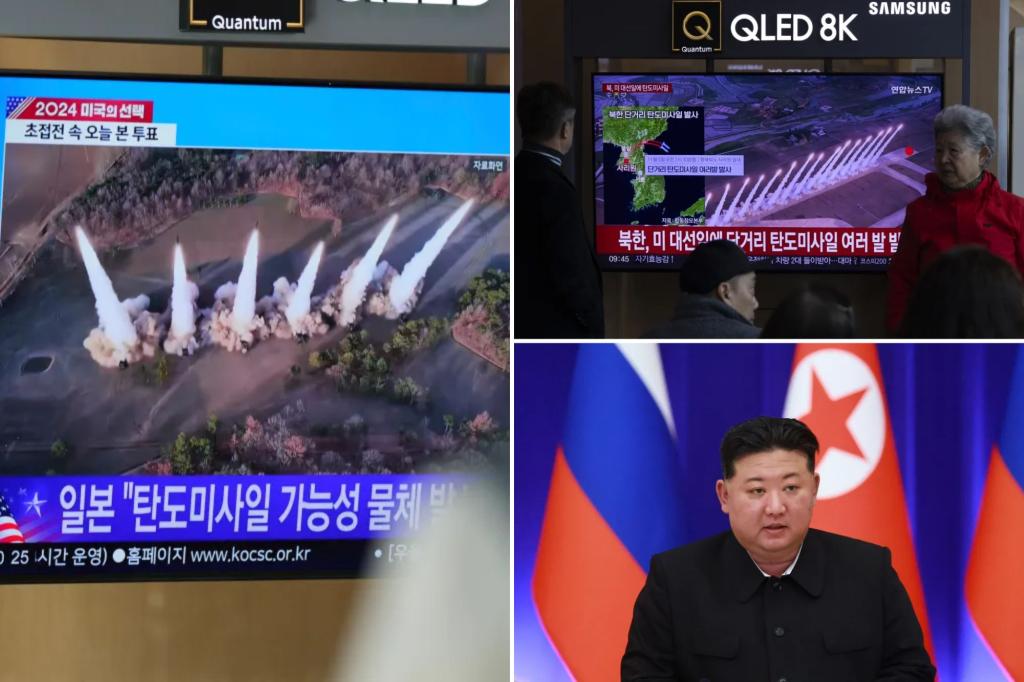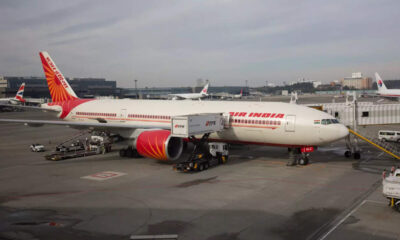Breaking News
North Korea fires a barrage of ballistic missiles toward the sea ahead of US election

North Korea conducted a series of short-range ballistic missile launches into the sea on Tuesday, just hours before the U.S. presidential election, according to reports from neighboring countries.
Japanese Defense Minister Gen Nakatani confirmed that at least seven North Korean missiles traveled up to 400 kilometers (250 miles) with a maximum altitude of 100 kilometers (60 miles), landing in the waters between the Korean Peninsula and Japan.
“North Korea’s actions, including a series of repeated missile launches, threaten the peace and safety of Japan, the region, and the international community,” Nakatani expressed concern.
South Korea’s military also detected multiple missile launches by North Korea and heightened its surveillance efforts in response.
The short-range North Korean missiles have the capability to target important facilities in South Korea, including U.S. military bases.
These launches followed North Korean leader Kim Jong Un’s supervision of a flight test of the country’s latest intercontinental ballistic missile designed to reach the U.S. mainland.
In reaction to the ICBM test, the United States conducted a trilateral military exercise with South Korea and Japan involving a long-range B-1B bomber on Sunday to show strength.
In a statement, Kim’s sister, Kim Yo Jong, accused North Korea’s rivals of escalating tensions with aggressive military threats.
Amid the U.S. presidential election, South Korean officials anticipated increased military displays from North Korea to gain Washington’s attention.
South Korea’s military intelligence agency reported last week that North Korea likely completed preparations for its seventh nuclear test.
Experts believe North Korea aims to leverage an expanded nuclear arsenal to secure concessions, such as sanctions relief, after the election of a new U.S. president.
There is a prevailing belief that Kim Jong Un prefers a victory for Republican candidate Donald Trump, with whom he engaged in nuclear diplomacy in 2018-19, over Democratic candidate Kamala Harris.
During her campaign, Harris made it clear that she would not engage with leaders like Kim Jong Un, whom she deemed tyrants and dictators rooting for Trump.
North Korea claimed that the Hwasong-19 missile tested on Oct. 31 was the world’s strongest ICBM, but experts question its practicality in warfare due to its size.
Key technologies required for a functional ICBM, such as ensuring the warhead survives atmospheric re-entry, are still lacking in North Korea’s missile program.
Tensions between North and South Korea have escalated as Kim flaunts the country’s nuclear and missile advancements, reportedly supporting Russia with munitions and troops in the Ukraine conflict.
Reports suggest that up to 10,000 North Korean soldiers are in Russia’s Kursk region near the Ukraine border, preparing to join Moscow’s military operations against Ukraine.
If engaged in combat, this would mark North Korea’s first significant involvement in a conflict since the Korean War of 1950-53.
Following a meeting in Seoul, South Korean and EU officials expressed concerns about Russia potentially aiding North Korea’s nuclear program in exchange for military support.
In response to North Korea’s nuclear threats, South Korea, the United States, and Japan have increased joint military exercises, which North Korea views as preparations for invasion.
At a U.N. Security Council meeting, North Korea defended its nuclear and ICBM programs as necessary responses to perceived nuclear threats from the United States.
U.S. Deputy Ambassador Robert Wood emphasized the need to address North Korea’s expanding nuclear program and its threat to U.S. security.
Wood also reiterated the call for Russia to clarify the presence of North Korean troops on its soil.
“We’re not in a court here,” responded Russian Deputy Ambassador Anna Evstigneeva, declining to answer the U.S. interrogation-style questions.
-

 Destination8 months ago
Destination8 months agoSingapore Airlines CEO set to join board of Air India, BA News, BA
-

 Breaking News10 months ago
Breaking News10 months agoCroatia to reintroduce compulsory military draft as regional tensions soar
-

 Gadgets3 months ago
Gadgets3 months agoSupernatural Season 16 Revival News, Cast, Plot and Release Date
-

 Tech News12 months ago
Tech News12 months agoBangladeshi police agents accused of selling citizens’ personal information on Telegram
-

 Productivity11 months ago
Productivity11 months agoHow Your Contact Center Can Become A Customer Engagement Center
-

 Gadgets3 weeks ago
Gadgets3 weeks agoFallout Season 2 Potential Release Date, Cast, Plot and News
-

 Breaking News10 months ago
Breaking News10 months agoBangladesh crisis: Refaat Ahmed sworn in as Bangladesh’s new chief justice
-

 Toys12 months ago
Toys12 months ago15 of the Best Trike & Tricycles Mums Recommend























